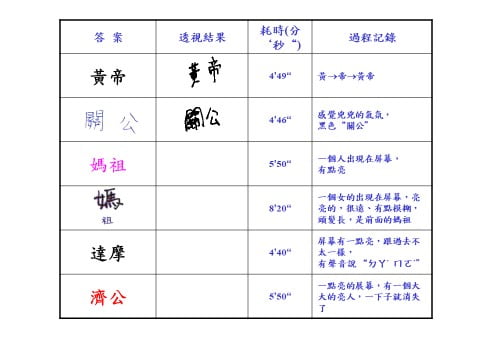撓場相關
2021.06.03

作者:李嗣涔教授
台灣各地都有廟宇,有大規模的佛寺、道觀,也有在路邊的一個小廟,供奉各式各樣的當地神靈,接受成百上千的信徒長期的膜拜,祂們真的在信息場設有網站嗎?
我們可以經由手指識字辨識關鍵字,而連上網站的首頁嗎?祂們的網站有沒有設密碼或防火牆?經過T小姐的手指識字實驗,我們獲得一些初步的結果,天眼中看到異像的神聖字彙如圖一所示有:
「皇帝」沒有異象,直接看到兩字; 「關公」:最先會有嚴肅的感覺,接著字就出現了﹔「玉皇大帝」:出現一點亮的銀幕﹔司人間祿籍的「文昌帝君」:看到有些暗有些白的花紋出現在銀幕上﹔「媽祖」:看到有一點亮的人﹔「濟公」:看到一個亮人或亮的銀幕,亮的程度只比佛或菩薩略低﹔禪宗的初祖「達摩」:看到有一點亮的銀幕,和以往看到的都不一樣。

在這些字彙中「關公」是三國時代蜀國的大將,本身並沒有修練成道的紀錄,後來與吳國戰爭中被所呂蒙所執不屈而死。被後來的皇帝封為「關聖帝君」,建廟接受民間的祭祀與膜拜,至今有一千多年。祂在信息場的網站,不像是自己的功力所建造,倒像是由中華民族的集體意識所塑造。
「文昌帝君」原為梓童帝君,性張,名亞子,居七曲山。仕晉戰歿,人為立廟,唐宋屢封為英顯王。道家謂梓童掌文昌府事及人間祿籍,故元加封為帝君,這均出於道家之附會。但是歷史上文昌帝君甚受讀書人的敬奉,至今仍受到許多考生的垂愛,每當聯考季節來臨,還是有很多考生紛紛前往文昌帝君廟祭拜,祈求考試順利。看來「文昌帝君」的網站也是民族的集體意識所塑造出來的。
由此來推論,若是一些神靈像佛菩薩神通廣大,自己有能力建立網站,再加上人間大規模的祭拜,有可能形成滾雪球效應,塑造出超級網站。

我們也注意到,T小姐無法連接到很多道家仙人或真人的網站,像八仙、張三丰、司馬承楨等,讓我們困惑了一段很長的時間。經我們詢問一位真正的今之道士,得知有可能是我們不知道網站的密碼之故。一般道士受到傳承的規範、師父的戒律,行事作風都很低調,也很神秘,千百年來一脈單傳或少數人傳,不欲人知,因此一般人通常不知誰是道士。沒有想到道士在信息場的網站,也很神秘很低調,不知密碼是不讓進去的。不像佛菩薩或是耶穌的網站,祂們在人間普渡眾生,指引信徒正確的道路,在信息場也是廣開善門,有緣者皆得進入。
我們也發現神明名字的撰寫,一定要工工整整,不可亂寫。像有一次一位參予手指識字的研究員,寫了「媽祖」一詞,不過是大「媽」小「祖」,「媽」字比「祖」字大了六倍(如圖一第四列所示),結果T小姐看到的亮人長的和正常「媽祖」不一樣。
原來神聖字彙的形狀在聯網時也扮演重要的角色,不同的字型顯然在聯網時重組了網頁的內容或扭曲了傳輸的資訊。還好媽祖是海神,是救苦救難的菩薩,也許不太在意你故意扭曲祂的網頁。要是碰到一個魔頭的網站時,也許就會遭到不好的報應了。與天溝通,務必誠意正心,規規矩矩的寫神聖字彙,以保平安。
加入官方 LINE 收取最新消息